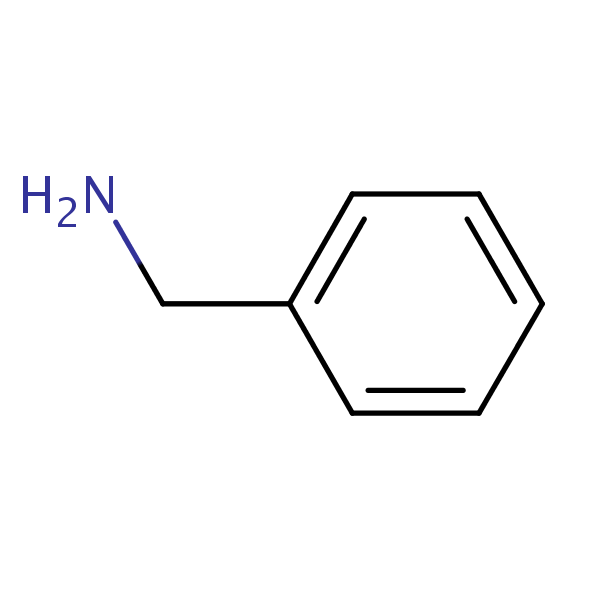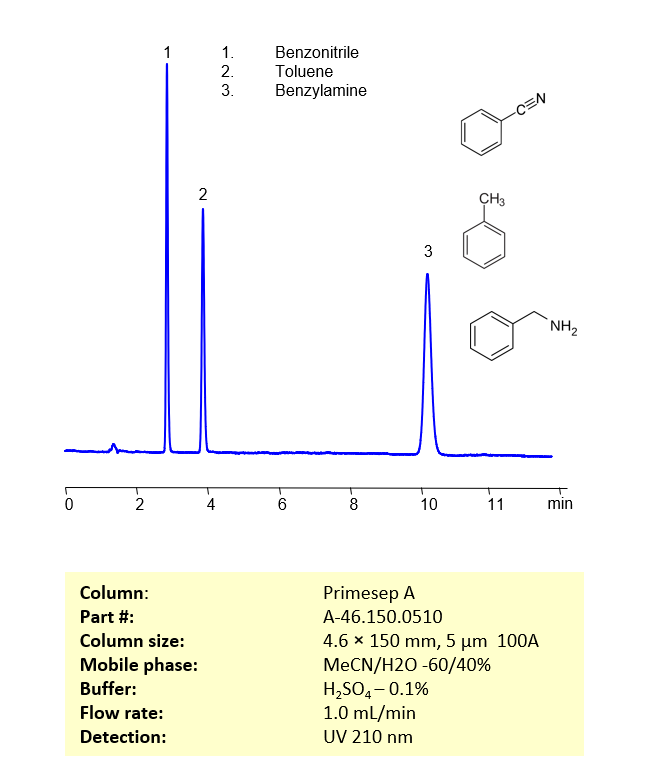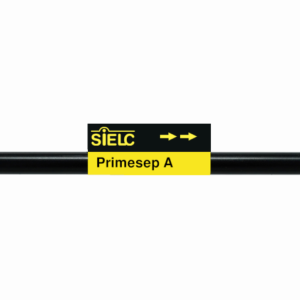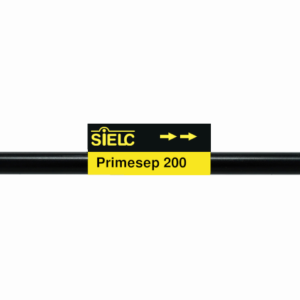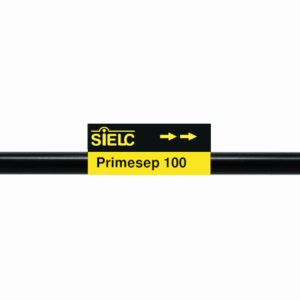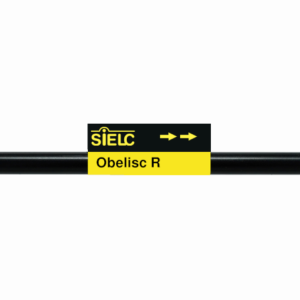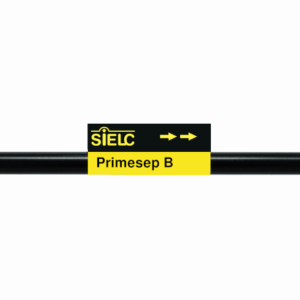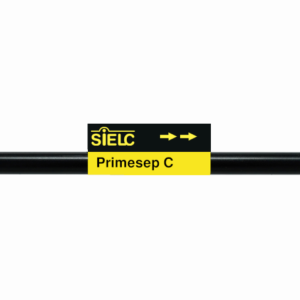| CAS Number | 100-46-9 |
|---|---|
| Molecular Formula | C7H9N |
| Molecular Weight | 107.156 |
| InChI Key | WGQKYBSKWIADBV-UHFFFAOYSA-N |
| LogP | 1.09 |
| Synonyms |
|
Applications:
UV- Vis Spectrum of Benzylamine
June 17, 2024
If you are looking for optimized HPLC method to analyze Benzylamine check our HPLC Applications library
For optimal results in HPLC analysis, it is recommended to measure absorbance at a wavelength that matches the absorption maximum of the compound(s) being analyzed. The UV spectrum shown can assist in selecting an appropriate wavelength for your analysis. Please note that certain mobile phases and buffers may block wavelengths below 230 nm, rendering absorbance measurement at these wavelengths ineffective. If detection below 230 nm is required, it is recommended to use acetonitrile and water as low UV-transparent mobile phases, with phosphoric acid and its salts, sulfuric acid, and TFA as buffers.
For some compounds, the UV-Vis Spectrum is affected by the pH of the mobile phase. The spectra presented here are measured with an acidic mobile phase that has a pH of 3 or lower.

HPLC Method for Separation of Benzonitrile, Toluene and Benzylamine on Primesep A Column
May 31, 2023
HPLC Method for Analysis of Benzonitrile, Toluene, Benzylamine on Primesep A by SIELC Technologies
Separation type: Liquid Chromatography Mixed-mode
- Benzonitrile: Benzonitrile (C₆H₅CN) is an aromatic organic compound. It is a colorless liquid with an almond-like odor. Benzonitrile is used as a solvent and a chemical intermediate in the production of a variety of compounds, including pharmaceuticals, dyes, and perfumes.
- Toluene: Toluene (C₇H₈) is a colorless, water-insoluble liquid with the smell associated with paint thinners. It is a mono-substituted benzene derivative, consisting of a CH₃ group attached to a phenyl group. It is an important organic solvent and is also used to produce benzene, and a number of consumer products including certain types of glue, paint thinners, and nail polish removers.
- Benzylamine: Benzylamine (C₆H₅CH₂NH₂) is a primary amine compound containing a benzyl group attached to the amino group. It is a colorless liquid with a faint almond-like odor. It is used as a chemical intermediate in the synthesis of a variety of substances, including pharmaceuticals, dyes, and polymers.
These chemicals are widely used in organic synthesis. Please handle these substances with care, as they can have hazardous effects. Always refer to the safety data sheets for each chemical and adhere to recommended safety procedures.
These three compounds be separate and analyzed on a reverse-phase Primesep A, 4.6 x 150 mm, 5 µm, 100 A, dual ended column with a mobile phase consisting of water, Acetonitrile (MeCN) and Sulfuric acid as a buffer modifier. This analysis method can be UV detected at 210 nm.
LOD was determined for this combination of instrument, method, and analyte, and it can vary from one laboratory to another even when the same general type of analysis is being performed.
High Performance Liquid Chromatography (HPLC) Method for Analysis of Benzonitrile, Toluene, Benzylamine
Condition
| Column | Primesep A, 4.6 x 150 mm, 5 µm, 100 A, dual ended |
| Mobile Phase | MeCN/H2O -60/40% |
| Buffer | H2SO4 |
| Flow Rate | 1.0 ml/min |
| Detection | UV 210 nm |
| Peaks Retention Time | 2.9, 4.0, 10.2 min |
| Samples concentration (Benzonitrile, Toluene, Benzylamine) | 0.04, 0.05, 0.07 mg/ml |
| Injection volume | 3 µl |
| Sample diluent | MeCN/H2O -60/40% |
| LOD (Benzonitrile, Toluene, Benzylamine) | 27, 65, 103 ppb |
Description
| Class of Compounds | Benzene, Aromatics |
| Analyzing Compounds | Benzonitrile, Toluene, Benzylamine |
Application Column
Primesep A
Column Diameter: 4.6 mm
Column Length: 150 mm
Particle Size: 5 µm
Pore Size: 100 A
Column options: dual ended
Benzylamine
Toluene

Generic Screening Method for Complex Mixtures on Primesep 200
October 15, 2015
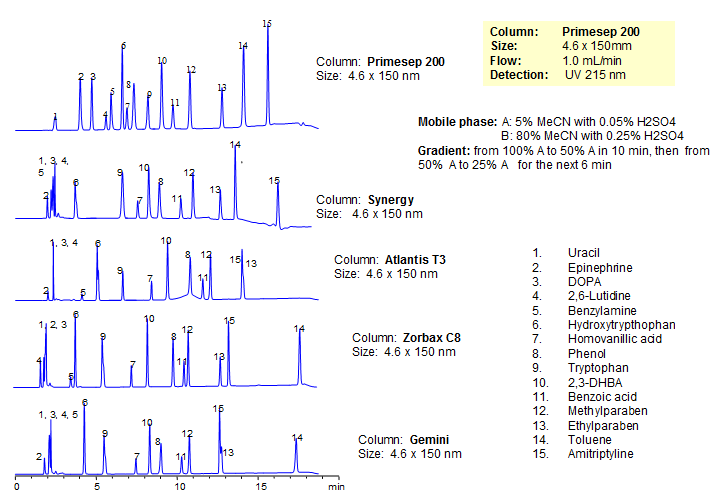
| Column | Primesep 200, 4.6*150 mm 5 µm, 100A |
| Mobile Phase | MeCN/H2O |
| Buffer | H2SO4 |
| Flow Rate | 1.0 ml/min |
| Detection | UV, 215 nm |
| Class of Compounds |
Drug, Acid, Hydrophilic, Ionizable, Hormone |
| Analyzing Compounds | Uracil, Epinephrine, DOPA, 2,6-Lutidine, Benzylamine, Hydroxytrypthophan, Homovanillic acid, Phenol, Tryptophan , 2,3-DHBA, Benzoic acid, Methylparaben, Ethylparaben, Toluene, Amitriptyline |
Application Column
Primesep 200
Column Diameter: 4.6 mm
Column Length: 150 mm
Particle Size: 5 µm
Pore Size: 100 A
Column options: dual ended
2,6-Lutidine
Amitriptyline
Benzoic Acid
Benzylamine
DOPA (3,4-dihydroxy-L-phenylalanine)
Epinephrine
Ethylparaben
Homovanillic Acid
Hydroxytryptophan
Methylparaben
Phenol
Toluene
Tryptophan
Uracil

HPLC Separation of 8 Generic Compounds on Primesep 200
March 27, 2011
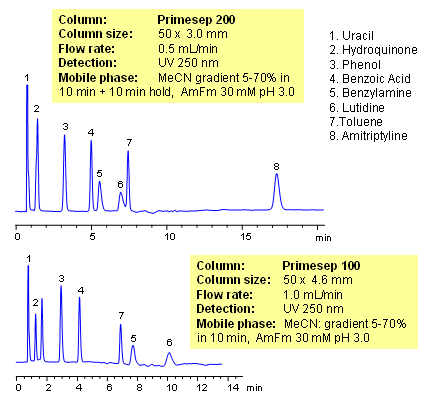
Mixed-mode HPLC columns allow to analyze compounds with drastically different properties in one run. Acidic, basic, and neutral compounds can be separated in one run using either isocratic or gradient conditions. In this application, neutral hydrophilic (uracil, phenol and hydroquinone), neutral hydrophobic (toluene), hydrophilic acidic (benzoic acid), hydrophilic basic (lutidine) and hydrophobic basic (amitriptyline) are separated using gradient of ACN. Neutral compounds are retained by reversed-phase mechanism, hydrophilic acidic compound become more hydrophobic at lower pH and retain by reversed-phase mechanism too. Basic compounds are retained by cation exchange mechanism, and hydrophobic basic compounds are retained by reversed-phase and cation-exchange mechanisms. All compounds are resolved within 17 minutes on a short column. Method can be applied to various polar and hydrophobic compounds, which can be separated on one column and in one run. Mixed-mode columns can operate in single or combination of several modes: reversed-phase, ion-exchange, ion-exclusion and HILIC. This mixed-mode HPLC column can be used as a general column for separation of wide range of compounds.
| Column | Primesep 200, Primesep 100 5 µm, 100A |
| Mobile Phase | MeCN/H2O |
| Buffer | AmFm pH3.0 |
| Flow Rate | 0.5 ml/min, 1.0 ml/min |
| Detection | UV, 250 nm |
| Class of Compounds |
Drug, Acid, Hydrophilic, Ionizable, Hormone |
| Analyzing Compounds | Uracil, Hydroquinone, Phenol, Benzoic Acid, Benzylamine, Lutidine, Toluene, Amitriptyline |
Application Column
Primesep 200
Column Diameter: 3.2 mm
Column Length: 50 mm
Particle Size: 5 µm
Pore Size: 100 A
Column options: dual ended
Benzoic Acid
Benzylamine
Hydroquinone
Lutidine
Phenol
Toluene
Uracil

HPLC Separation of 8 Generic Compounds on Primesep 100
March 27, 2011

Mixed-mode HPLC columns allow to analyze compounds with drastically different properties in one run. Acidic, basic, and neutral compounds can be separated in one run using either isocratic or gradient conditions. In this application, neutral hydrophilic (uracil, phenol and hydroquinone), neutral hydrophobic (toluene), hydrophilic acidic (benzoic acid), hydrophilic basic (lutidine) and hydrophobic basic (amitriptyline) are separated using gradient of ACN. Neutral compounds are retained by reversed-phase mechanism, hydrophilic acidic compound become more hydrophobic at lower pH and retain by reversed-phase mechanism too. Basic compounds are retained by cation exchange mechanism, and hydrophobic basic compounds are retained by reversed-phase and cation-exchange mechanisms. All compounds are resolved within 17 minutes on a short column. Method can be applied to various polar and hydrophobic compounds, which can be separated on one column and in one run. Mixed-mode columns can operate in single or combination of several modes: reversed-phase, ion-exchange, ion-exclusion and HILIC. This mixed-mode HPLC column can be used as a general column for separation of wide range of compounds.
| Column | Primesep 200, Primesep 100 5 µm, 100A |
| Mobile Phase | MeCN/H2O |
| Buffer | AmFm pH3.0 |
| Flow Rate | 0.5 ml/min, 1.0 ml/min |
| Detection | UV, 250 nm |
| Class of Compounds |
Drug, Acid, Hydrophilic, Ionizable, Hormone |
| Analyzing Compounds | Uracil, Hydroquinone, Phenol, Benzoic Acid, Benzylamine, Lutidine, Toluene, Amitriptyline |
Application Column
Primesep 100
Column Diameter: 4.6 mm
Column Length: 50 mm
Particle Size: 5 µm
Pore Size: 100 A
Column options: dual ended
Benzoic Acid
Benzylamine
Hydroquinone
Lutidine
Phenol
Toluene
Uracil

HPLC Separation of Acidic, Basic, and Neutral Compounds on Primesep 200
November 21, 2010

Primesep 100 and Primesep 200 columns can be used as a universal column for analysis of wide range of compounds. These mixed-mode reversed-phase ion-exchange HPLC columns can provide a valuable alternative to traditional reversed-phase column. Amines, amino acids, quaternary amines, and various zwitter-ions can be analyzed along with hydrophobic compounds and organic and inorganic counter-ions. In this application, 8 compounds with different hydrophobic, hydrophilic, basic and acidic properties are separated based on their properties. Primesep 100 column is a mixed-mode HPLC column with a C12 carbon chain and carboxylic acid on the surface with pKa of 1. Primesep 200 column is a mixed-mode HPLC column with a C12 carbon chain and carboxylic acid on the surface with pKa of 2. These columns can be used with 100% organic (ACN) and 100% aqueous mobile phases. This HPLC method can be adopted as a generic and robust approach for analysis of acidic, basic and neutral compounds within the same run.
| Column | Primesep 200, 3.0×50 mm, 5 µm, 100A |
| Mobile Phase | MeCN/H2O |
| Buffer | AmFm pH3.0 |
| Flow Rate | 0.5 ml/min |
| Detection | UV, 250 nm |
| Class of Compounds |
Drug, Acid, Hydrophilic, Ionizable, Hormone |
| Analyzing Compounds | Uracil, Hydroquinone, Phenol, Benzoic Acid, Benzylamine, Lutidine, Toluene, Amitriptyline |
Application Column
Primesep 200
Column Diameter: 3.2 mm
Column Length: 50 mm
Particle Size: 5 µm
Pore Size: 100 A
Column options: dual ended
Benzoic Acid
Benzylamine
Hydroquinone
Lutidine
Phenol
Toluene
Uracil

Effect of mobile phase composition on retention of 3 compounds on Obelisc R
March 3, 2010
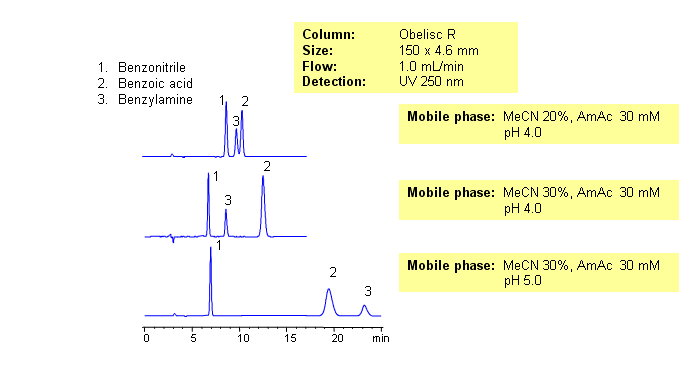
This application shows the effect of mobile phase composition on retention of acidic, basic and neutral compound. Retention of basic and acidic compounds is controlled by buffer pH and concentration, while retention of neutral compound is controlled by the amount of acetonitrile. Buffer pH changes not only ionization state of ionizable basic and acidic compounds, but ionization state of trimodal stationary phase Obelisc R. Available detection techniques include UV, ELSD, LC/MS, and Corona.
| Column | Obelisc R, 4.6×150 mm, 5 µm, 100A |
| Mobile Phase | MeCN/H2O |
| Buffer | AmAc |
| Flow Rate | 1.0 ml/min |
| Detection | 250 |
| Class of Compounds |
Acid, Hydrophilic, Neutral, BasicIonizable |
| Analyzing Compounds | Benzonitrile, Benzoic Acid, Benzylamine |
Application Column
Obelisc R
SIELC has developed the Obelisc™ columns, which are mixed-mode and utilize Liquid Separation Cell technology (LiSC™). These cost-effective columns are the first of their kind to be commercially available and can replace multiple HPLC columns, including reversed-phase (RP), AQ-type reversed-phase, polar-embedded group RP columns, normal-phase, cation-exchange, anion-exchange, ion-exclusion, and HILIC (Hydrophilic Interaction Liquid Chromatography) columns. By controlling just three orthogonal method parameters - buffer concentration, buffer pH, and organic modifier concentration - users can adjust the column properties with pinpoint precision to separate complex mixtures.
Select optionsBenzonitrile
Benzylamine

HPLC Separation of Amino Acids, Bases, Acids, and Neutrals on Obelisc R
March 3, 2007
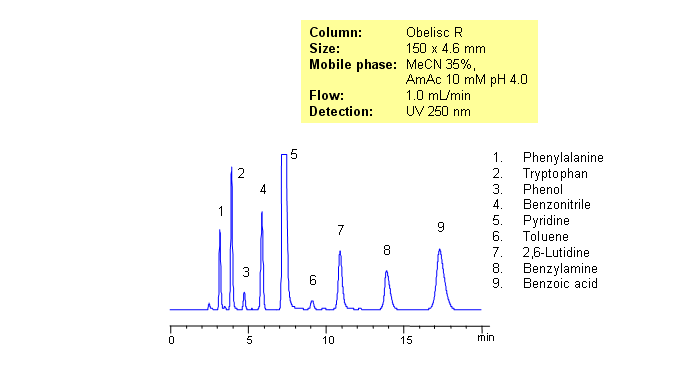
Separating basic, acidic and zwitterionic compounds in one run in reverse-phase HPLC can be very challenging. The methods might require the use of ion-pairing reagents and complex gradients that can make MS-compatibility difficult. Obelisc R column which has both positive and negative ion-pairs embedded in the stationary phase allows for fine tuning and separation of a wide range of compounds with different ionic properties. Acids, bases, amino acids and neutral compounds were separated isocratically in one run using a simple MS-compatible mobile phase of acetonitrile (ACN) and water with Ammonium Acetate (AmAc) buffer. Can also be UV detected at 250nm.
| Column | Obelisc R, 4.6×250 mm, 5 µm, 100A |
| Mobile Phase | MeCN/H2O – 35/65% |
| Buffer | AmAc 10 mM pH 4.0 |
| Flow Rate | 1.0 ml/min |
| Detection | UV, 250 nm |
| Class of Compounds |
Drug, Acid, Bases, Neutral, Hydrophilic, Ionizable, Vitamin, Supplements, Amino acid |
| Analyzing Compounds | Amino acids |
Application Column
Obelisc R
SIELC has developed the Obelisc™ columns, which are mixed-mode and utilize Liquid Separation Cell technology (LiSC™). These cost-effective columns are the first of their kind to be commercially available and can replace multiple HPLC columns, including reversed-phase (RP), AQ-type reversed-phase, polar-embedded group RP columns, normal-phase, cation-exchange, anion-exchange, ion-exclusion, and HILIC (Hydrophilic Interaction Liquid Chromatography) columns. By controlling just three orthogonal method parameters - buffer concentration, buffer pH, and organic modifier concentration - users can adjust the column properties with pinpoint precision to separate complex mixtures.
Select optionsBenzoic Acid
Benzonitrile
Benzylamine
Phenol
Phenylalanine
Pyridine
Toluene
Tryptophan

Complex Mixture of Acids, Bases, Amino Acids, and Neutral Compounds
October 14, 2006
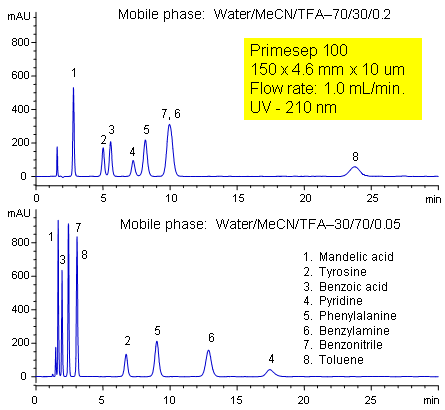
Primesep 100 separates a mixture of amino acids (tyrosine, phenylalanine), organic acids (benzoic acid, mandelic acid), amines (benzylamine, pyridine), and neutrals (benzonitrile, toluene) in one HPLC run by combining reversed-phase, cation-exchange, and polar interactions. The method is tunable and peak order can be changed significantly by adjusting acetonitrile and trifluoroacetic acid concentrations. The separation method uses a mobile phase mixture of water, acetonitrile (MeCN, ACN) and trifluoracetic acid (TFA) and compatible with UV, mass spec (LC/MS) and evaporative light scattering (ELSD) detection.
| Column | Primesep 100, 4.6×250 mm, 5 µm, 100A |
| Mobile Phase | MeCN/H2O – 30/70% |
| Buffer | TFA – 0.2 |
| Flow Rate | 1.0 ml/min |
| Detection | UV, 210 nm |
| Class of Compounds |
Drug, Acid, Hydrophilic, Ionizable, Vitamin, Supplements, Amino acid |
| Analyzing Compounds | Tyrosine, phenylalanine, Benzoic acid, mandelic acid, Benzylamine, Pyridine, Benzonitrile, Toluene |
Application Column
Primesep 100
The Primesep family of mixed-mode columns offers a wide variety of stationary phases, boasting unprecedented selectivity in the separation of a broad array of chemical compounds across multiple applications. Corresponding Primesep guard columns, available with all stationary phases, do not require holders. SIELC provides a method development service available to all customers. Inquire about our specially-tailored custom LC-phases for specific separations.
Select optionsBenzoic Acid
Benzonitrile
Benzylamine
Mandelic Acid
Organic Acids
Phenylalanine
Pyridine
Toluene
Tyrosine

Neutral, Base, and Acid on Primesep B Column
November 15, 2005
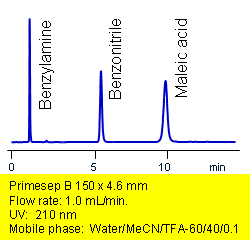
Primesep B separates acids, bases, and neutrals in one injection. Maleic acid, benzonitrile, and benzylamine are baseline resolved by a combination of reversed-phase, ion-exchange, and ion-exclusion mechanisms. Excellent peak shape results with a mass spec compatible mobile phase of water, acetonitrile (MeCN, ACN) and trifluoracetic acid (TFA) with UV detection at 210 nm.
Application Column
Primesep B
The Primesep family of mixed-mode columns offers a wide variety of stationary phases, boasting unprecedented selectivity in the separation of a broad array of chemical compounds across multiple applications. Corresponding Primesep guard columns, available with all stationary phases, do not require holders. SIELC provides a method development service available to all customers. Inquire about our specially-tailored custom LC-phases for specific separations.
Select optionsBenzylamine
Maleic Acid

Neutral, Base, and Acid on Primesep A Column
November 14, 2005
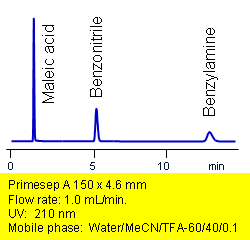
Primesep A separates acids, bases, and neutrals in one injection. Maleic acid, benzonitrile, and benzylamine are baseline resolved by a combination of reversed-phase, ion-exchange, and ion-exclusion mechanisms. Excellent peak shape results with a mass spec compatible mobile phase of water, acetonitrile (MeCN, ACN) and trifluoracetic acid (TFA) with UV detection at 210 nm.
Application Column
Primesep A
The Primesep family of mixed-mode columns offers a wide variety of stationary phases, boasting unprecedented selectivity in the separation of a broad array of chemical compounds across multiple applications. Corresponding Primesep guard columns, available with all stationary phases, do not require holders. SIELC provides a method development service available to all customers. Inquire about our specially-tailored custom LC-phases for specific separations.
Select optionsBenzylamine
Maleic Acid

Neutral, Base, and Acid on Primesep 100 Column
November 14, 2005
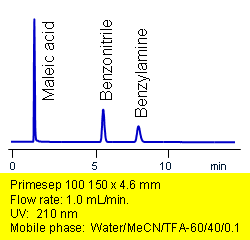
Primesep 100 retains and separates an acid, base, and neutral in one HPLC injection. Maleic acid, benzylamine, and benzonitrile are resolved by ion-exclusion, ion-exhange and reversed-phase modes. The separation uses a mobile phase of water, acetonitrile (MeCN, ACN) and trifluoracetic acid (TFA) with UV detection at 210 nm.
Application Column
Primesep 100
The Primesep family of mixed-mode columns offers a wide variety of stationary phases, boasting unprecedented selectivity in the separation of a broad array of chemical compounds across multiple applications. Corresponding Primesep guard columns, available with all stationary phases, do not require holders. SIELC provides a method development service available to all customers. Inquire about our specially-tailored custom LC-phases for specific separations.
Select optionsBenzylamine
Maleic Acid

Neutral, Base, and Acid on Primesep 200 Column
November 14, 2005
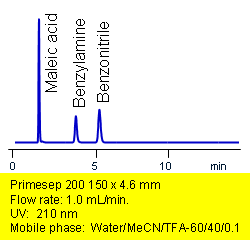
Primesep 200 separates acids, bases, and neutrals in one injection. Maleic acid, benzonitrile, and benzylamine are baseline resolved by a combination of reversed-phase, ion-exchange, and ion-exclusion mechanisms. Excellent peak shape results with a mass spec compatible mobile phase of water, acetonitrile (MeCN, ACN) and trifluoracetic acid (TFA) with UV detection at 210 nm.
Application Column
Primesep 200
The Primesep family of mixed-mode columns offers a wide variety of stationary phases, boasting unprecedented selectivity in the separation of a broad array of chemical compounds across multiple applications. Corresponding Primesep guard columns, available with all stationary phases, do not require holders. SIELC provides a method development service available to all customers. Inquire about our specially-tailored custom LC-phases for specific separations.
Select optionsBenzylamine
Maleic Acid

Control of Cation Exchange Properties by pH of Primesep C Column
October 12, 2005
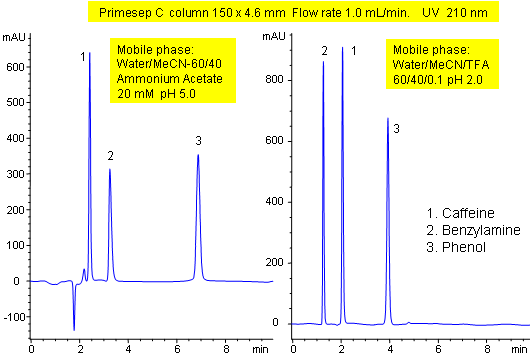
Primesep C demonstrates the control of ion-exchange properties of Primesep columns. The peak order of caffeine and benzylamine in a mixture of caffeine, benzylamine, and phenol reverses when the mobile phase modifier is changed from ammonium acetate to trifluoroacetic acid. Control of the separation is possible even with mass spec (LC/MS) compatible mobile phases of water, acetonitrile (MeCN, ACN) and ammonium acetate or trifluoroacetic acid (TFA).
Application Column
Primesep C
The Primesep family of mixed-mode columns offers a wide variety of stationary phases, boasting unprecedented selectivity in the separation of a broad array of chemical compounds across multiple applications. Corresponding Primesep guard columns, available with all stationary phases, do not require holders. SIELC provides a method development service available to all customers. Inquire about our specially-tailored custom LC-phases for specific separations.
Select optionsCaffeine
Phenol

Primesep C Column Retention Control
March 27, 2004
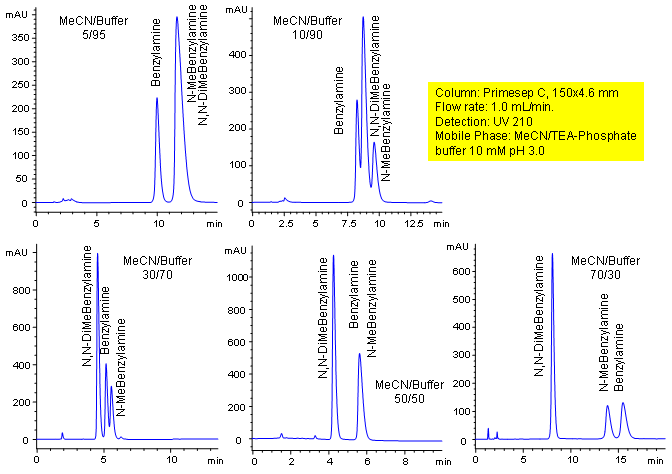
Primesep C separates benzylamines with an easily tunable HPLC method that allows retention control. Benzylamine, N-methylbenzylamine, and N,N-dimethylbenzylamine peak order and retention can be significantly changed by altering the water/acetonitrile ratio in the mobile phase which changes the combination of cation exchange, complex formation, and hydrophobic interactions. This mixture is separated with a mobile phase of water, acetonitrile (MeCN, ACN) and triethylamine (TEA) phosphate with UV detection at 210 nm.
| Column | Primesep C, 4.6×150 mm, 5 µm, 100A |
| Mobile Phase | MeCN/H2O |
| Buffer | TEAPh |
| Flow Rate | 1.0 ml/min |
| Detection | UV 210 |
| Class of Compounds | Hydrophilic, Ionizable |
| Analyzing Compounds | Benzylamine, N-methylbenzylamine, N,N-dimethylbenzylamine |
Application Column
Primesep C
The Primesep family of mixed-mode columns offers a wide variety of stationary phases, boasting unprecedented selectivity in the separation of a broad array of chemical compounds across multiple applications. Corresponding Primesep guard columns, available with all stationary phases, do not require holders. SIELC provides a method development service available to all customers. Inquire about our specially-tailored custom LC-phases for specific separations.
Select optionsN,N-Dimethylbenzylamine
N-Methylbenzylamine

